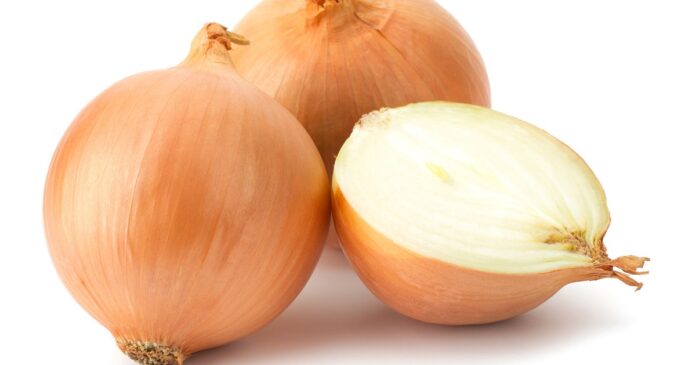Onions are members of the Allium genus of flowering plants that also includes garlic, shallots, leeks and chives.
These vegetables contain various vitamins, minerals and potent plant compounds that have been shown to promote health in many ways.
Onion health benefits.
-
Nutrients rich
Onions are rich in food nutrients, especially in minerals and vitamins. One average size bulb of onion contains a low amount of calories and high amounts of vitamins, minerals and fibre.
Vitamin C also acts as a powerful antioxidant in your body, protecting your cells against damage caused by unstable molecules called free radicals.
Onions are also rich in B vitamins, including folate (B9) and pyridoxine (B6) which play key roles in metabolism, red blood cell production and nerve function.
Onion is also a good source of potassium.
-
Contributes to Heart Health
Onions contain antioxidants and compounds that fight inflammation, decrease triglycerides and reduce cholesterol levels. These may help in reducing the risk of heart disease.
Their potent anti-inflammatory properties may also help reduce high blood pressure and protect against blood clots.
Onions have also been shown to decrease cholesterol levels.
-
Rich in Antioxidants
Antioxidants are compounds that inhibit oxidation, a process that leads to cellular damage and contributes to diseases like cancer, diabetes and heart disease.
Onions are an excellent source of antioxidants. In fact, they contain over 25 different varieties of flavonoid antioxidants.
Red onions, in particular, contain anthocyanins. They are special plant pigments in the flavonoid family that give red onions their deep colour.
Also, anthocyanins have been found to protect against certain types of cancer and diabetes.
-
Contain Cancer-Fighting Compounds
Consumption of vegetables of the Allium genus like garlic and onions has been linked to a lower risk of certain cancers, including stomach and colorectal.
Onions also contain fisetin and quercetin, flavonoid antioxidants that may inhibit tumour growth.
-
Control Blood Sugar
Due to the many beneficial compounds found in onions, consuming them may help reduce high blood sugar.
Specific compounds found in onions, such as quercetin and sulfur compounds, possess antidiabetic effects.
Quercetin has been shown to interact with cells in the small intestine, pancreas, skeletal muscle, fat tissue and liver to control whole-body blood sugar regulation.
-
May Boost Bone Density
Adding up to onion health benefits is its ability to help support strong bones.
A study in 24 middle-aged and postmenopausal women showed that those who consumed 3.4 ounces (100 ml) of onion juice daily for eight weeks had improved bone mineral density and antioxidant activity compared to a control group.
Furthermore, the study demonstrated that older women who most frequently ate onions decreased their risk of hip fracture by more than 20% compared to those who never ate them.
Onions are also believed to help reduce oxidative stress, boost antioxidant levels and decrease bone loss, which may prevent osteoporosis and boost bone density.
-
Antibacterial Properties
One of the p, such as Escherichia coli (E. coli), Pseudomonas aeruginosa, Staphylococcus aureus (S. aureus) and Bacillus cereus.
Furthermore, onion extract has been shown to inhibit the growth of Vibrio cholerae, a bacteria that is a major public health concern in the developing world.
Quercetin extracted from onions seems to be a particularly powerful way to fight bacteria.
-
Boost Digestive Health
Onions are a rich source of prebiotics, which help boost digestive health, improve the bacterial balance in your gut and benefit your immune system
Prebiotics are nondigestible types of fibre that are broken down by beneficial gut bacteria.
Gut bacteria feed on prebiotics and create short-chain fatty acids including acetate, propionate and butyrate.
Research has shown that these short-chain fatty acids strengthen gut health, boost immunity, reduce inflammation and enhance digestion.
Additionally, consuming foods rich in prebiotics helps increase probiotics, such as Lactobacillus and bifidobacteria strains, which benefit digestive health.
A diet rich in prebiotics may help improve the absorption of important minerals like calcium, which may improve bone health.
Onions are particularly rich in prebiotics inulin and fructooligosaccharides. These help increase the number of friendly bacteria in your gut and improve immune function.
Nutrition Facts
| Nutritional value per 100 g (3.5 oz) | |
|---|---|
| Energy | 166 kJ (40 kcal) |
|
Carbohydrates
|
9.34 g
|
| Sugars | 4.24 g |
| Dietary fibre | 1.7 g |
|
Fat
|
0.1 g
|
|
Protein
|
1.1 g
|
| Vitamins | Quantity %DV† |
| Thiamine (B1) |
4%
0.046 mg |
| Riboflavin (B2) |
2%
0.027 mg |
| Niacin (B3) |
1%
0.116 mg |
| Pantothenic acid (B5) |
2%
0.123 mg |
| Vitamin B6 |
9%
0.12 mg |
| Folate (B9) |
5%
19 μg |
| Vitamin C |
9%
7.4 mg |
| Minerals | Quantity %DV† |
| Calcium |
2%
23 mg |
| Iron |
2%
0.21 mg |
| Magnesium |
3%
10 mg |
| Manganese |
6%
0.129 mg |
| Phosphorus |
4%
29 mg |
| Potassium |
3%
146 mg |
| Zinc |
2%
0.17 mg |
| Other constituents | Quantity |
| Water | 89.11 g |
| Fluoride | 1.1 µg |
|
|
| Percentages are roughly approximated using US recommendations for adults. Source: USDA Nutrient Database |
|
Reference
9 Impressive Health Benefits of Onions – healthline.com


